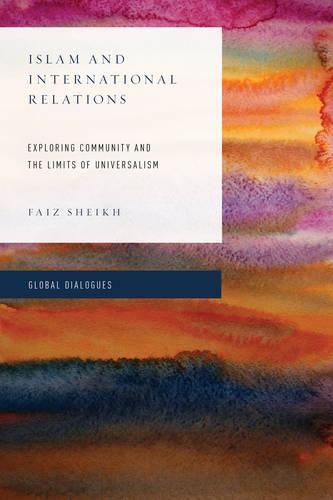
Islam and International Relations: Exploring Community and the Limits of Universalism
(Paperback)
Available Formats
Publishing Details
Islam and International Relations: Exploring Community and the Limits of Universalism
By (Author) Faiz Sheikh
Bloomsbury Publishing PLC
Rowman & Littlefield International
11th July 2016
United Kingdom
Classifications
Tertiary Education
Non Fiction
Political science and theory
Social groups: religious groups and communities
327.101
Physical Properties
Paperback
220
Width 150mm, Height 230mm, Spine 16mm
331g
Description
International Relations tends to rely on concepts that developed on the European continent, obscuring the fact that its history is far less international than one might expect. But in todays global world, who does this ignore and marginalize And what impact does that have on the disciplines potential to assess world politics This book explores an Islamic approach to the international, showing that Islam can contribute keen insights into how we do IR, and how we might change that practice to be more inclusive, while also highlighting the limits of an Islamic International Relations. Exploring conceptualizations of community and difference in Islamic traditions, the book relates these notions to concepts that are considered universal in IR, such as state-based politics and the necessity for secularism. In this way, the book shows how the study of political Islam might help to interrogate and redefine key concepts within international politics. In a world of continuing polarization between Islam and the West, this book offers IR a chance to engage in a constructive dialogue with Islamic traditions, in order to better understand global politics.
Reviews
Faiz Sheikh judiciously examines the widely held assumption that a system of states and Islam rub uncomfortably against each other. In so doing, he rescues political Islam from radicalised interpretations and international relations from preconceived secularism. Avoiding a facile reconciliation of value pluralism and religious certainty, moreover, he sensibly holds out hope of counter-balancing restraint. Therein lies wisdom, and a path forward from supposed civilisational antipathy. -- James Piscatori, Professor of International Relations, Durham University
The past twenty years has witnessed a paradigmatic attempt to transcend Western-centric conceptualization of international relations and to reach a global understanding of IR In this welcome contribution by Faiz Sheikh, we are invited to re-consider the secularist, liberal-individualist and territorialist biases in Western IR as well as the relative insularity of Western values I believe this book will be of great interest to all of us, scholars and students of IR, political Islam and sociology of Islam -- Zana Citak, Associate Professor, Middle East Technical University
Faiz Sheikh explores the enduring contention between Islamic political thought and International Relations. This contention has deep roots in ontological, epistemological, and normative differences, and most IR scholars unfortunately rely on easy models of convergence or divergence, or commit to reductionism or generalizations. Faiz Sheikh avoids these pitfalls. What emerges is a careful groundwork to help us to think through the building blocks of Islamic international political thought and have a sense for what that intellectual project may contribute to International Relations. -- Turan Kayaoglu, Professor of International Relations, University of Washington Tacoma
Author Bio
Faiz Sheikh is a Marie Curie Postdoctoral Fellow at the University of Hamburg, Germany. He is involved in the European Commission funded Initial Training Network, Power and Region in a Multipolar World, a collaborative project involving 11 institutions across 9 countries. He has published articles in Politics, Religion & Ideology.
